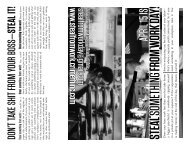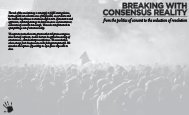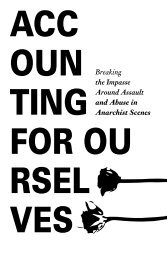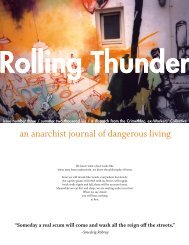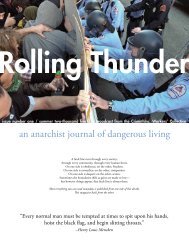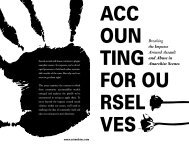HEiST! - CrimethInc
HEiST! - CrimethInc
HEiST! - CrimethInc
Create successful ePaper yourself
Turn your PDF publications into a flip-book with our unique Google optimized e-Paper software.
Beyond<br />
Stealing<br />
from<br />
Work<br />
rather than with his or her own interests. People<br />
identify with the interests of those who exploit<br />
them for a variety of reasons: notions of right<br />
and wrong (which are often framed by those in<br />
power), the idea that they might become employers<br />
themselves one day, a hesitance to acknowledge<br />
the embarrassing fact of their own<br />
exploitation. Employers thrive on the tensions<br />
and competition between their employees: so<br />
long as the employees don’t view themselves as<br />
having shared interests, they will not act together<br />
to defend themselves. Instead, they may turn<br />
each other in for small-scale attempts to redress<br />
the grievous imbalances of the workplace.<br />
Capitalist values are founded on the idea<br />
that those who own capital deserve the power<br />
it affords them; in concrete terms, this includes<br />
the power it gives them over others’ lives, even<br />
though this is hardly a “democratic” relationship.<br />
Capitalism implies a meritocracy: the best<br />
and brightest are rewarded with the most power,<br />
and everyone else ends up serving them. In<br />
practice, of course, the cutthroat competition<br />
of the market often rewards the most rapacious<br />
and merciless with the most power. Stealing<br />
from one’s workplace can be seen as an attempt<br />
to distribute power and resources according to<br />
a logic of need rather than of conquest.<br />
Employees who turn in co-workers for stealing<br />
may be trying to abide by the Golden Rule<br />
– do unto others as you would have them<br />
do unto you. But stealing from a corporation<br />
is fundamentally different than stealing<br />
from another human being. The wealth of<br />
a corporation is the accumulation of profit<br />
derived from workers who are not paid the<br />
full value of their labor and consumers who<br />
pay more than the production cost of their<br />
purchases. Redistributing this wealth is not<br />
stealing so much as it is reversing the effects of<br />
a theft that is already in progress. Workplace<br />
theft is thus a challenge to the morality of<br />
capitalist meritocracy; at best, it can imply a<br />
totally different value system.




